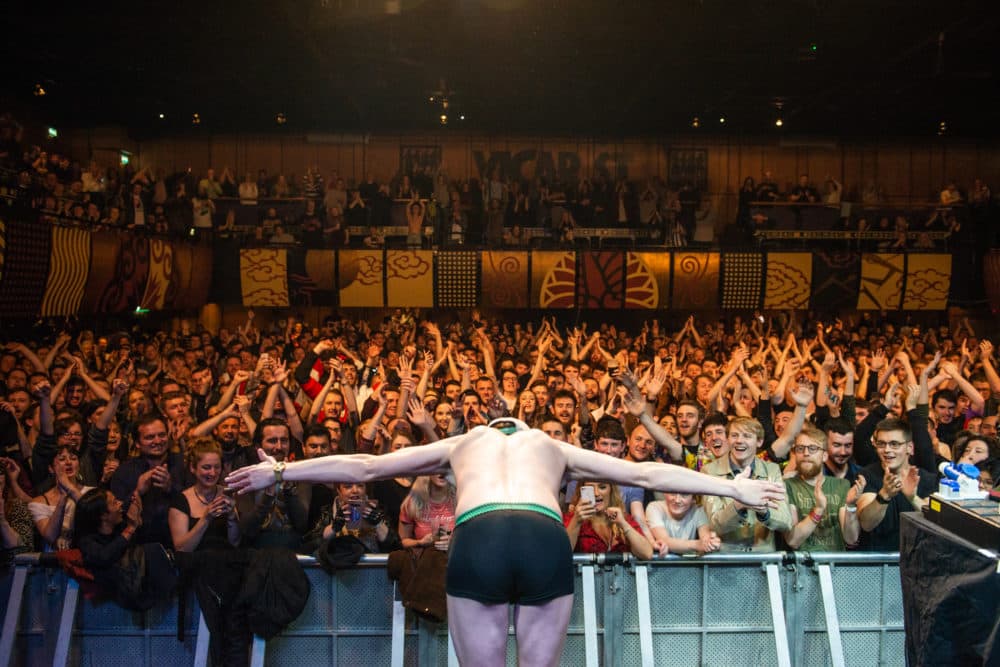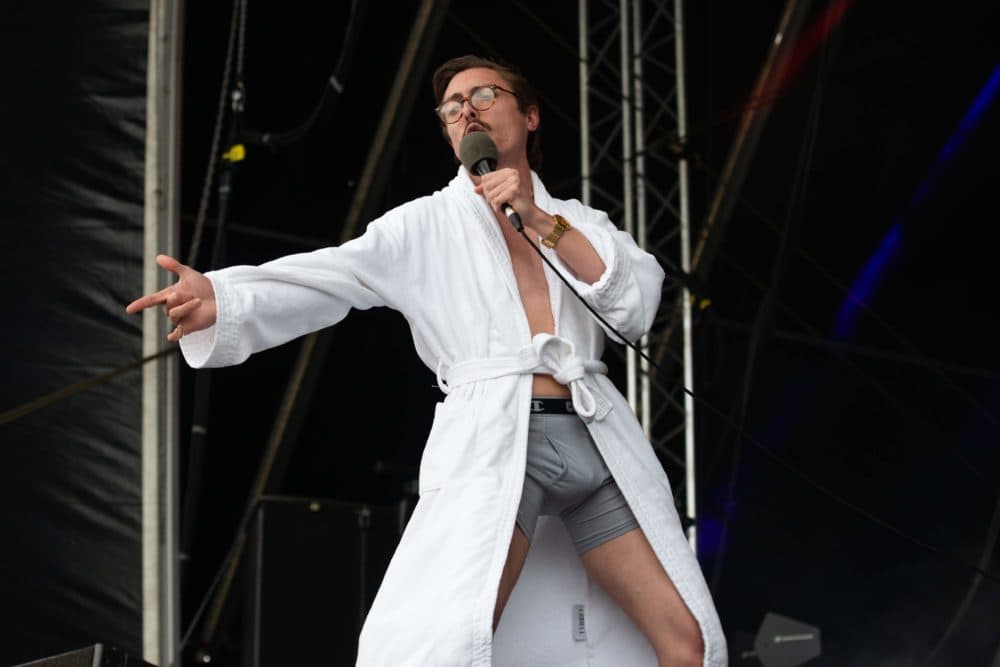Advertisement
Musician Marc Rebillet Wants To Make You Laugh — And Maybe Buy A Robe

Marc Rebillet — also known as “Loop Daddy” — embraces absurdity.
The Youtuber and electronic musician has amassed hundreds of thousands of followers who fawn at his unabashed joy of creating music from scratch in his living room concerts. Now he tours, oftentimes only dressed in a robe and underwear, entertaining people in real life.
“Slowly but surely over the next couple tours, people started coming to the shows in robes,” he says. “Now it's become this sort of like cabaret burlesque thing where at some point in the show the robe is coming off.”
Rebillet then carries on the rest of the show in his underwear.
The Dallas, Texas, native started playing the piano at the age of five, was classically trained by 15, and eventually attended the Booker T. Washington High School for the Performing and Visual Arts. He says his music career didn’t take off right away, but rather slowly progressed into a viral sensation.
What attracts people to his craft is his spontaneity and his ability to take the music seriously, but not himself. His music, online and on stage, is put together on the fly, most times with input from his fans.
Rebillet puts a phone number on social media so fans can call in, then crafts a song using their ideas.
“I have conversations with strangers and then they provide me with a topic to make a song about — and then I make a song about that,” he says. “Sometimes it sucks. Sometimes it's not so bad. But generally, there's always food there to eat musically.”

Interview Highlights
On his beginnings as a musician who recorded in his bedroom and living room, to now touring and performing in front of thousands
“It's very bizarre. It's very bizarre. I mean, this was something that I was doing while I was working a job at a call center, entertaining myself, really hoping for maybe something in the distant future. … Eventually, I lost that job and I started playing local gigs in Dallas where I'm originally from. From there, things just slowly progressed, and a few months later, I was in New York. And then I don't know, man. It's just really odd. It's just odd to be here doing an interview with NPR. That whole thing is very weird, but I'm happy about it.”
On making a piece of music from nothing
“That's sort of the I guess my selling point, if you want to call it that. The thing that makes my concerts, something that hopefully people want to come back to and the live streams that I do is everything is made up from scratch just off the top of the head. And the way I do that online is I take callers, I have a number up on the screen that people can call.”
On the element of ridiculousness in his performances
“That is the show. That is the show 100%. It always has been. I hope it always is to a degree, because, I don't know, I think there are a lot of musicians who are very gifted and who can take themselves and their art very seriously. I have never thought of myself that way. I take the music seriously. It should sound good at least. But the message... I don't know. It should always be either very happy or very silly and ridiculous for me.”
On his robes
“Oh, boy. Well, recently there have been a lot of robes. And that came about just as a result of me touring and making a couple videos in robes. I like wearing robes when I'm home. It's just comfortable. People have turned that into a little baby meme on the internet. … And that's just the way it is. It probably won't be that way forever. But that's the way it is right now. I'm thinking maybe on the next tour I'll wear, like, really well-tailored suits. I might still take it off.”
On paying homage to his father
“He was an incredible human. He was a Parisian born in Paris, born and raised. [He had] about as thick a French accent as you can imagine. Very charismatic, huge energy, big flirt, married to my mom for 48 years before he passed. And his passing sort of coincided with me starting to do this music thing professionally. He had always told me for years and years that I need to be the one on stage. I need to be the one singing. I need to get out there and do it. Push it. Keep going. I always resented him for that when I was younger because I just wasn't ready. I wasn't ready to do that.
“But as he slipped sort of into dementia, which is what he passed from, I found myself becoming attracted to that. The saddest thing is that he never got to see any of this. He died at the end of 2018. And he just would have loved this, and I miss him a lot.”
On bringing fans levity and joy through his off-the-cuff songs
“I hear from a lot of people that what I'm doing with this is brings them something valuable — like brings them joy or comfort in times of depression and crisis. And I'm sort of a comfort in that way. And that is just incredible to me. Not something I ever anticipated being a part of this show, but it is, and that has informed the music that I'm making now. I find myself making music on positivity and encouragement like big, big, happy love stuff. You got this. I believe in you. You can do this. You know, like it's something. It's really something.”
Cristina Kim produced and edited this interview for broadcast with Peter O'Dowd. Serena McMahon adapted it for the web.
This segment aired on March 9, 2020.

